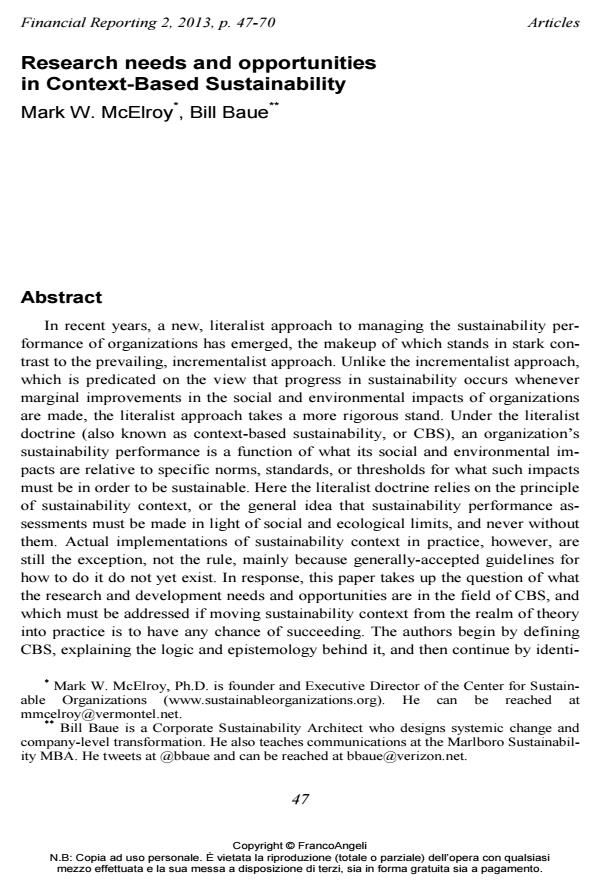Research needs and opportunities in Context-Based Sustainability
Titolo Rivista FINANCIAL REPORTING
Autori/Curatori Mark W. McElroy, Bill Baue
Anno di pubblicazione 2013 Fascicolo 2013/2
Lingua Inglese Numero pagine 24 P. 47-70 Dimensione file 703 KB
DOI 10.3280/FR2013-002004
Il DOI è il codice a barre della proprietà intellettuale: per saperne di più
clicca qui
Qui sotto puoi vedere in anteprima la prima pagina di questo articolo.
Se questo articolo ti interessa, lo puoi acquistare (e scaricare in formato pdf) seguendo le facili indicazioni per acquistare il download credit. Acquista Download Credits per scaricare questo Articolo in formato PDF

FrancoAngeli è membro della Publishers International Linking Association, Inc (PILA), associazione indipendente e non profit per facilitare (attraverso i servizi tecnologici implementati da CrossRef.org) l’accesso degli studiosi ai contenuti digitali nelle pubblicazioni professionali e scientifiche.
In recent years, a new, literalist approach to managing the sustainability performanceof organizations has emerged, the makeup of which stands in stark contrastto the prevailing, incrementalist approach. Unlike the incrementalist approach,which is predicated on the view that progress in sustainability occurs whenevermarginal improvements in the social and environmental impacts of organizationsare made, the literalist approach takes a more rigorous stand. Under the literalistdoctrine (also known as context-based sustainability, or CBS), an organization’ssustainability performance is a function of what its social and environmental impactsare relative to specific norms, standards, or thresholds for what such impactsmust be in order to be sustainable. Here the literalist doctrine relies on the principleof sustainability context, or the general idea that sustainability performance assessmentsmust be made in light of social and ecological limits, and never withoutthem. Actual implementations of sustainability context in practice, however, arestill the exception, not the rule, mainly because generally-accepted guidelines forhow to do it do not yet exist. In response, this paper takes up the question of whatthe research and development needs and opportunities are in the field of CBS, andwhich must be addressed if moving sustainability context from the realm of theoryinto practice is to have any chance of succeeding. The authors begin by definingCBS, explaining the logic and epistemology behind it, and then continue by identifying and discussing specific issues of interest for further research and developmentin the social and environmental accounting domains.
Parole chiave:Epistemology; incrementalist; literalist; sustainability context.
- How to Articulate Beyond GDP and Businesses’ Social and Environmental Indicators? Olivier E. Malay, in Social Indicators Research /2021 pp.1
DOI: 10.1007/s11205-020-02583-6 - The time-to-sustainability optimization strategy for sustainable supply network design M. Kannegiesser, H.-O. Günther, N. Autenrieb, in Journal of Cleaner Production /2015 pp.451
DOI: 10.1016/j.jclepro.2015.06.030
Mark W. McElroy, Bill Baue, Research needs and opportunities in Context-Based Sustainability in "FINANCIAL REPORTING" 2/2013, pp 47-70, DOI: 10.3280/FR2013-002004